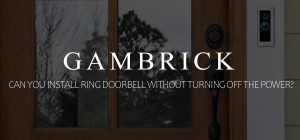Can You Use An Oven To Heat Your House?
During a power outage or severe storm your home’s heating system could be inoperable for an extended period of time. If this happens during Winter months keeping warm could be a struggle. Especially if you don’t have another source of heat like a wood burning fireplace or space heater. Many people think they can turn on the oven for heat because it gets so hot. But this is a big mistake. You can not use an oven to heat your house. Leaving the door open on a gas oven releases harmful carbon monoxide into the air. Carbon monoxide is a potentially fatal gas that’s produced when natural gas is burnt. When the oven is operating normally it’s not an issue. However, it could be dangerous and potentially fatal if you try to use your oven as a heater.
Having said that, it’s safe to use an oven for heat as long as you’re using it properly with the door closed. I’ve spent entire 16 hour days baking with my home oven and it can really heat up my small kitchen. But I wouldn’t leave it on while you sleep or overnight.
To stay warm during times without a heater dress warmly and find an alternate heat source. A fireplace or electric space heater are the best choices. Cover your windows and doors with heavy blankets to limit drafts and heat loss. Limit heating to a single room with a door you can close.
While the chance of freezing to death in your home is slim, there’s a higher chance of dying from fire or carbon monoxide poisoning.
Is It Safe To Use An Oven To Heat Your Home?
It is not safe to use an oven to heat your home. If you have a gas oven, leaving the door open to heat your home releases harmful carbon monoxide into the air. And carbon monoxide can potentially be fatal if given enough time.
Carbon monoxide can also make conditions like asthma, emphysema and other similar health concerns worse.
Because carbon monoxide is such a dangerous gas most areas require carbon monoxide detectors to be installed along side smoke detectors. A nickname for carbon monoxide is the silent killer so you definitely don’t want too much of it released into your home.
Another potential concern is fire. Ovens are not designed to be used while the door is open for long periods of time. While the door is closed the fire is contained. However when the door is open there’s a danger something could catch fire.
An oven used properly with the door closed will put out a good amount of heat and is safe to use. But I wouldn’t keep it on all night or when your sleeping. A cold day when the heat is out is a great time to do some baking. You’ll not only have a great meal but also warm the kitchen.
The Dangers Of Heating Your Home With An Oven
Even in the coldest weather, you should never use a stove to heat your home. Most people don’t realize how dangerous an oven can be if the door if left open for long periods of time.
Gas ovens burn natural gas. A bi-product of burning natural gas is carbon monoxide. This isn’t an issue when the door is closed but it’s very dangerous when the door’s left open. Carbon monoxide gas can escape into the house which are harmful to your health.
- NEVER USE YOUR OVEN FOR HEATING: Kitchen ovens are not designed for heating homes. They’re for cooking while the oven door is closed.
- Carbon Monoxide (CO): CO is an invisible, odorless, tasteless gas that’s harmful to your health and potentially fatal. Moderate levels cause headaches, dizziness, nausea, and fainting. At high levels it can be fatal. The gas is emitted anytime combustion appliances like gas stoves are used. They’re safe as long as you use them as designed and not as a heater.
- Never Leave High Heat Unattended: Leaving a high heat oven unattended is a bad idea.
Never Use A Gas Oven To Heat Your Home Or Apartment
Never use a gas oven to heat your home or apartment. Leaving the door open while the ovens on could lead to carbon monoxide poisoning. This is harmful to your health and potentially fatal.
If you use a gas oven to heat your home, you’re putting yourself at risk for Carbon Monoxide (CO) Poisoning.
Carbon monoxide is an invisible, odorless, and tasteless gas. Without a carbon monoxide detector inside the home there’s no way to know it’s there. This is where the nickname silent killer comes from.
- Small amounts of carbon monoxide exposure can cause headaches, dizziness, nausea, and fainting.
- High levels of exposure can be fatal.
When you use a stove correctly there’s need to worry about carbon monoxide poisoning because the door is sealed.
Using a gas oven to heat your home is very dangerous and not a good idea. An oven does not have safety features for depleted oxygen levels or carbon monoxide production.
A gas oven can produce 800 parts per million of carbon monoxide for 12 hours and still be rated as safe. But air concentration levels as low as 5PPM can be dangerous. An oven should put out no more than 50 when the door is closed. But when the door is opened it can potentially create dangerous levels.
How To Warm Your House When The Heat Is Out
If your heat goes out during Winter there are a few things you can do to warm the house.
- Open the blinds, drapes, and curtains during the day. This will let in sunlight and heat. But don’t forget to close them at night.
- Seal drafty windows and doors.
- Close all your doors and focus on heating just one room in the house.
- Make sure to keep a space heater in the house just in case. But make sure to turn it off when leaving the room or going to bed.
- Lock the windows and don’t simply close them. Locking them seals them tighter which may prevent small drafts.
- If you’re lucky enough to have a wood burning fireplace light a fire.
- When using a fuel burning space heater, always use the proper fuel as specified by the manufacturer. And make sure to vent it outdoors.
Heating a home when the furnace won;t light is very hard if you’re not prepared. If you have a fireplace, have wood on hand and some starter logs. make sure to keep matches or a lighter. Keep a portable heater in the house with the proper fuel and a way to vent it outdoors. Dress warm and stick to a single room of the house. And never use an oven to heat the house.
Select A Single Room To Heat
When the heat goes out it’s best to try and heat a single small room rather than the entire house.
Here are a few tips to consider:
- Try to heat a room on the “warm” side of the house.
- Choose an area away from strong winds.
- Choose a room that gets the most direct sunlight.
- Avoid rooms with large windows or uninsulated walls.
- Bathrooms tend to have low heat loss because of how they’re finished. They’re also small and easier to keep warm than larger rooms with more windows.
- A basement is usually warmer than the first floor during cold weather. The earth acts as insulation, minimizes heat loss and prevents drafts. This is especially true if the basement ceiling is insulated.
- Isolate the room by keeping doors closed and hanging bedding or heavy drapes over entryways.
- Hang heavy drapes or blankets over doors and windows.
Important Safety Precautions To Follow
Safety is extremely important when trying to heat a home when the heater isn’t working. You can’t just burn random things for heat and using the stove isn’t safe.
Here are some things to consider:
- Don’t burn anything larger than candles inside the house without proper ventilation.
- All heaters need to be vented except electric.
- Do not use a portable propane heater inside the house without venting it.
- If you use an unvented heater, cross-ventilate by opening a window on each side of the room. It’s better to let in some cold air than to risk carbon monoxide poisoning.
- Don’t use a gas or electric oven for heating.
- Don’t burn outdoor barbecue materials like charcoal inside the house. This includes inside a fireplace. Charcoal requires a special oven which seals in order to be burnt inside a home.
Using An Electric Oven To Heat A House
An electric oven is powered by electricity, not gas. This makes it safer to leave running than a gas stove because it doesn’t produce carbon monoxide.However it’s still not a good idea to use one as a heater.
Leaving an electric oven on for a few hours during the day to heat a room shouldn’t be dangerous. It’s not much different than using the stove for normal cooking. However I wouldn’t do it while you’re asleep or unattended. Using an oven in a way it’s not designed for can still be dangerous because it produces high amounts of heat and could cause a fire or an electrical issue.
Electric ovens are not intended to be used as a heater so extended use may cause a problem. They’re also fairly expensive to operate. Electric costs more than natural gas so if you keep it on for long periods of time expect to pay a big bill at the end of the month.
I wouldn’t recommend using an oven to heat your house, even if it’s electric. However, if you use it to cook with the oven will put out some heat.
Summary: Can You Use An Oven To Heat Your House?
During a power outage or severe storm your home’s heating system could be inoperable for an extended period of time. If this happens during Winter months keeping warm could be a struggle. Especially if you don’t have another source of heat like a wood burning fireplace or space heater. Many people think they can turn on the oven for heat because it gets so hot. But this is a big mistake. You can not use an oven to heat your house. Leaving the door open on a gas oven releases harmful carbon monoxide into the air. Carbon monoxide is a potentially fatal gas that’s produced when natural gas is burnt. When the oven is operating normally it’s not an issue. However, it could be dangerous and potentially fatal if you try to use your oven as a heater.
Having said that, it’s safe to use an oven for heat as long as you’re using it properly with the door closed. I’ve spent entire 16 hour days baking with my home oven and it can really heat up my small kitchen. But I wouldn’t leave it on while you sleep or overnight.
To stay warm during times without a heater dress warmly and find an alternate heat source. A fireplace or electric space heater are the best choices. Cover your windows and doors with heavy blankets to limit drafts and heat loss. Limit heating to a single room with a door you can close.
While the chance of freezing to death in your home is slim, there’s a higher chance of dying from fire or carbon monoxide poisoning.
If you have any questions or comments about the article email any time.






















